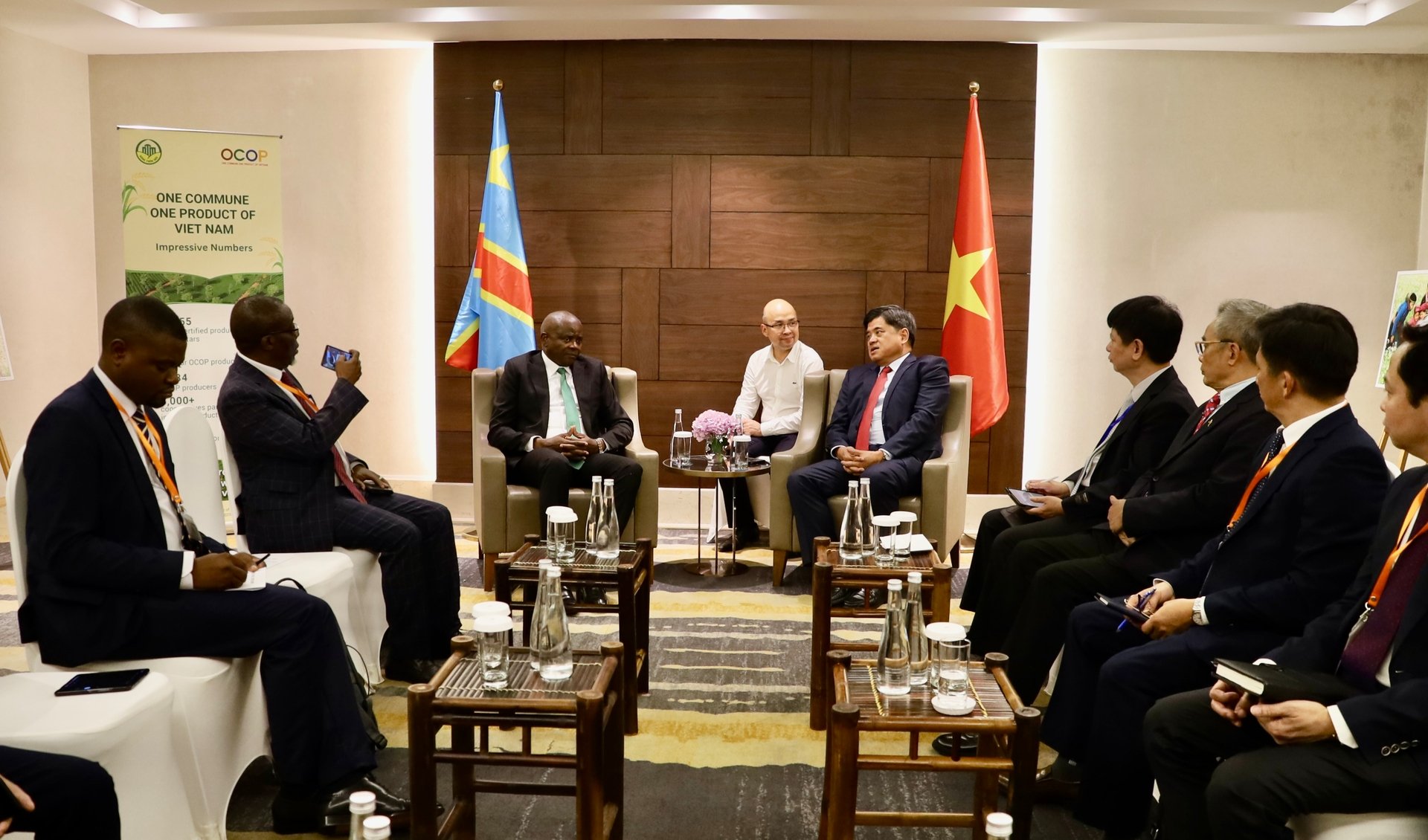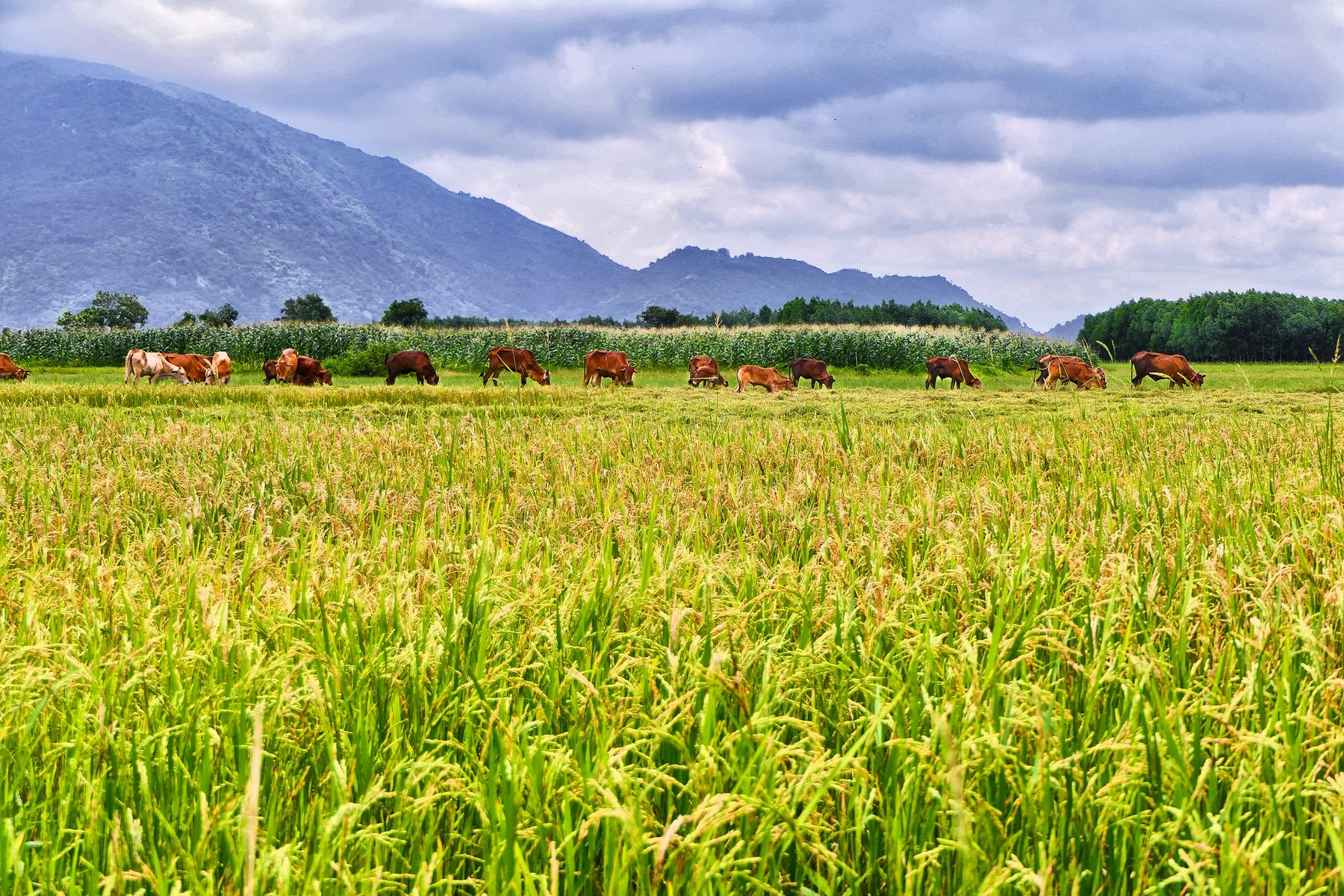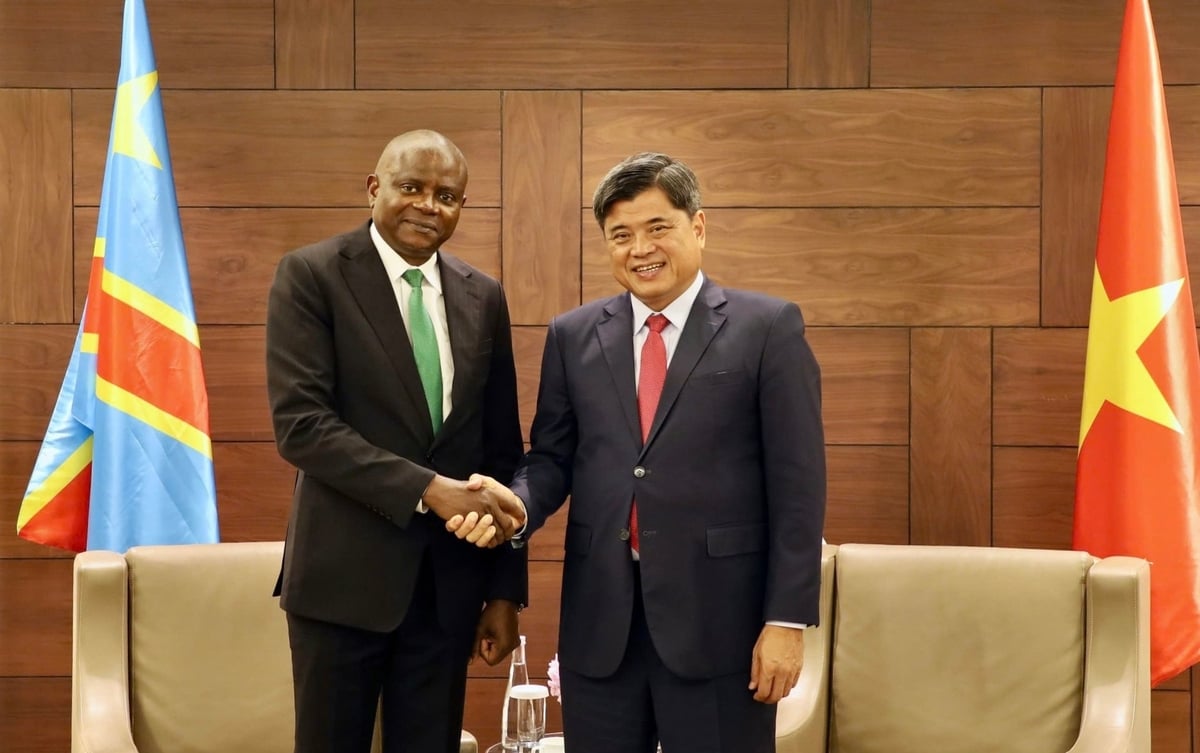January 1, 2026 | 01:47 GMT +7
January 1, 2026 | 01:47 GMT +7
Hotline: 0913.378.918
January 1, 2026 | 01:47 GMT +7
Hotline: 0913.378.918
At the bilateral meeting on the sidelines of the High-Level Inter-regional Knowledge Exchange on One Country One Priority Product (OCOP) Models on the afternoon of July 15, Mr. Grégoire Mutshail Mutomb Kangaji - Minister of Agriculture and Fisheries of Congo - expressed his admiration for Vietnam's advancements in mechanization, agricultural production, and the application of science and technology.
He shared that with approximately 80 million hectares of arable land and climate, hydrological, and soil conditions similar to those of Vietnam, Congo holds great potential for promoting bilateral cooperation in the field of agriculture.

On the afternoon of July 15, Deputy Minister of Agriculture and Environment Tran Thanh Nam received the Minister of Agriculture and Fisheries of the Democratic Republic of Congo. Photo: Phuong Linh.
Congo has identified maize, cassava, and rice as the three strategic crops at the core of its national agricultural development strategy. Recognizing the importance of food security and self-reliance, the country is in the process of reorganizing its agricultural production chains and establishing multi-sector cooperatives. These efforts aim to achieve self-sufficiency in maize production, thereby gradually reducing the country's reliance on imported food products.
In the livestock and aquaculture sectors, the Congolese government is prioritizing poultry and fish farming, which are considered critical to reducing food import costs and enhancing the country's capacity for domestic food supply. These targeted investments reflect Congo’s broader commitment to strengthening its food system and ensuring long-term sustainability in agricultural production.
"We possess many raw material mines for fertilizer production, such as phosphorus and other minerals, but they have not yet been effectively exploited. Therefore, I hope the two countries can explore this potential through the South-South cooperation mechanism," Mr. Kangaji said.
In addition to welcoming Vietnamese experts and private enterprises to support agricultural development, the Congolese government is committed to allocating dedicated land for Vietnamese investors, creating favorable conditions to promote sustainable agriculture in line with poverty reduction and food security goals.

Vietnam's strategy is to focus on developing rice cultivation - the key crop to ensure national food security - before expanding into other sectors. Photo: Tran Trung.
Listening carefully to the proposals from the Congolese side, Deputy Minister Tran Thanh Nam affirmed that ensuring food security remains the foremost priority within Vietnam’s agricultural development strategy. He emphasized that Congo needs to clearly identify and leverage its own unique agricultural strengths and advantages to build a practical development roadmap.
Sharing Vietnam’s experience, the Deputy Minister stated that rice was selected as the strategic crop to guarantee national food security before expanding into other sectors such as crop cultivation, aquaculture, and livestock farming. The subsequent step in this approach is to diversify both crop and livestock production, aiming to establish a sustainable agricultural production structure with a broad variety of food products, thereby enhancing resilience and economic value.
Vietnam has consistently maintained a stable cultivation area for maize and cassava. This strategy supports the demand for raw materials used in food processing industries and livestock feed production, reflecting the importance of balancing food security with industrial development.
Deputy Minister Nam also highlighted that crop varieties are a decisive factor in successful agricultural production. Important elements such as modern cultivation techniques, appropriate fertilizer inputs, and mechanization follow closely —all of which contribute to reducing production costs and improving soil health. Furthermore, an essential aspect is the organization of production models tailored to fit the farming customs and practices of local farmers in different regions.

Vietnam is ready to support Congo in modernizing its agricultural sector through the South-South cooperation mechanism. Photo: Phuong Linh.
"Effective agricultural production is the foundation that allows Vietnamese enterprises to confidently invest, thereby opening up opportunities for long-term commercial cooperation. The Vietnamese side is ready to accompany and support Congo in the aforementioned fields to enhance productivity and production efficiency in Congo.
Beyond the agricultural sector, Vietnam also has sufficient experience and capacity to explore other potential areas of cooperation with Congo jointly. However, further discussions are needed to agree on effective and sustainable cooperation mechanisms," Mr. Nam stated.
The Food and Agriculture Organization of the United Nations (FAO) is promoting a program to transform food and agriculture systems in Africa through the South-South cooperation mechanism. This model aligns well with the conditions and potentials of both Vietnam and Congo. On this basis, the Deputy Minister proposed that the two sides engage in discussions with FAO to establish a trilateral cooperation framework, aiming to maximize the utilization of resources and expertise for sustainable agricultural development.
Translated by Phuong Linh

(VAN) Located in three former provinces, Nam Dinh, Thai Binh, and Ninh Binh, and now in two provinces, Ninh Binh and Hung Yen, "Red River Delta" is the name of Vietnam's first interprovincial coastal wetland World Biosphere Reserve.
/2025/12/29/1046-1-210728_624.jpg)
(VAN) In 2025, Viet Nam recorded severe and extreme disasters, breaking multiple historical records and causing heavy losses in lives, property, and infrastructure nationwide.

(VAN) Applied technologies, water-saving irrigation is a strategic solution to promote climate-resilient agriculture and strengthen water security in the uplands.
/2025/12/29/3936-3-163422_251.jpg)
(VAN) Can Gio mangrove forest in particular and the entire Can Gio Mangrove Biosphere Reserve in general hold great potential for carbon credits.

(VAN) Chu Pah Rubber has announced its products that comply with the EU Deforestation Regulation (EUDR), affirming its commitment to sustainable production and product origin transparency.

(VAN) Deputy Director Nguyen Hoai Nam stated that a digital data platform will be developed with agricultural sector databases, utilizing AI to help farmers make informed decisions on 'watering correctly, sufficiently, and efficiently.’
/2025/12/29/4841-2-134224_777.jpg)
(VAN) From only about 10 individuals in 2009, the wild elephant population in Dong Nai has recovered to nearly 30 animals after more than 10 years.